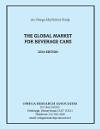McDonald’s to replace foam beverage cups with paper
Fast food leader will replace polystyrene foam hot beverage cups with paper-based cups in U.S. restaurants.

McDonald’s Corp. has confirmed that it will replace all polystyrene beverage cups with paper cups at its 14,000 U.S. outlets. The move comes in response to a shareholder proposal filed by As you Sow in 2011, asking McDonald’s to stop using the polystyrene foam.
In 2012, the company agreed to test replacement of its foam cups with double-walled paper hot cups at approximately 2,000 restaurants, primarily on the West Coast. The company deemed the pilots successful and the paper cup will now become the standard hot beverage cup at all U.S. outlets.
“We congratulate McDonald’s on its decision to stop using foam beverage cups, which will reduce the threat of plastic pollution to the world’s oceans and provide a more recyclable, valuable alternative in paper fiber,” says Conrad MacKerron, senior vice president for As You Sow, a nonprofit organization that promotes corporate responsibility through shareholder advocacy.
Polystyrene is not widely recycled and has become pervasive in the marine environment, carried through storm drains to the ocean. It breaks down into small indigestible pellets that birds and marine mammals mistake for food, resulting in their death. Several cities in California have banned or restricted the use of polystyrene food packaging and Mayor Bloomberg has proposed a ban on foam in New York City.
McDonald’s began to phase out its iconic clamshell foam hamburger box in 1990 amid controversy about the environmental impacts of polystyrene, but continue to use foam beverage cups.
“McDonald’s has made a great start by phasing out foam,” says McKerron. “We hope they will also incorporate recycled fiber in the cups and develop on-site systems to collect and recycle food service packaging.” McDonald’s is already a major purchaser of recycled fiber used in its food containers, bags and napkins.
As You Sow is also in dialogue with Dunkin’ Donuts, which uses foam hot beverage cups. The company recently announced plans to phase out foam cups in two to three years but has not disclosed what materials will be used instead.
There are also occupational risks associated with styrene, which is used to make polystyrene. The International Agency for Research on Cancer has determined that styrene is a possible human carcinogen and it has been listed as a possible carcinogen by the National Institute of Health’s National Toxicology Program.
Looking for a reprint of this article?
From high-res PDFs to custom plaques, order your copy today!







